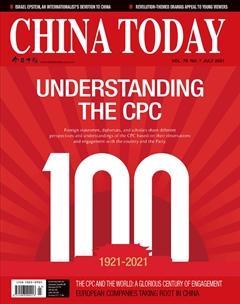China’s Path Towards National Unity and Common Prosperity
Among the feudal dynasties in Chinese history, some exerted far-reaching influence in the world such as the Tang Dynasty (618-907). They took cultural refinements recognized by various ethnic groups as the ideological basis for the sound operation of society, forming a Chinese civilization featuring the unity of humanity and nature, the dialectical nature of yin and yang, etiquette and morality, unity and solidarity, inclusiveness and openness, democracy and rule of law.
In modern China however, the bondage of feudal monarchy, oppression by imperialism, and the scourge of bureaucratic capitalism cast darkness over the country. Numerous attempts were made to save China, but all political movements such as the Westernization Movement, the Hundred Days Reform, and the 1911 Revolution, and ideological trends such as Darwinism, anarchism, and pragmatism, failed. At the critical moment in history, brilliant intellectuals such as Li Dazhao, Chen Duxiu, and Mao Zedong realized that only socialism could save China, so they founded the Communist Party of China (CPC).
After the founding of the CPC, a new revolutionary path of encircling the cities from the countryside and seizing state power by military force was created, and in 1949, the Peoples Republic of China was founded. Later, in order to lift China from poverty and backwardness, the CPC established a new socialist system and formed independent and relatively complete industrial and economic systems in China.
In 1978, the CPC initiated an epoch-defining institutional innovation of reform and opening-up, which once again greatly liberated and developed productive forces and created a “miraculous”economic boom and long-term social stability. All this undoubtedly owes much to CPCs basic principles in governing the country: establishing a social system in line with socialist fundamentals, and incorporating experience gained in practice into the system.
Chinas economic system has public ownership as the mainstay. The peoples congress system, the system of multi-party cooperation and political consultation under the leadership of the CPC, and a system of regional ethnic autonomy have been established in the PRC. These systems are both in accordance with the basic principles of scientific socialism, and also in line with Chinas actual conditions.
In the economic field, public ownership occupies the dominant position, which avoids economic polarization and is conducive to the goal of common prosperity. This has become the core and foundation of the theoretical system of socialism with Chinese characteristics.
General Secretary of the CPC Central Committee Xi Jinping once said that people form the country our Party builds and protects, and our ultimate goal is to lead them to a better life. Since the 18th CPC National Congress held in 2012, the Party and the country have waged a tough battle against poverty. Over 255,000 work teams based in villages have been on the frontline. Plus the efforts made by nearly two million township officials and millions of village officials, all of the 98.99 million poor rural residents have been lifted out of extreme poverty in just eight years. It marked a big leap forward for the Chinese nation towards common prosperity, and bears testament to the strengths of the Chinese social system.
In October 2017, Xi pointed out in his report to the 19th CPC National Congress, “Socialism with Chinese characteristics has entered a new era.” In the face of global changes, the Party has implemented the strategy of making comprehensive moves to finish building a moderately prosperous society in all respects, deepening reform, advancing law-based governance, and strengthening Party self-governance, and the integrated plan of promoting coordinated economic, political, cultural, social, and ecological progress.
The CPC has made many judicious and creative propositions such as the CPCs leadership being the most essential feature of socialism with Chinese characteristics, embracing a people-centered philosophy of development, common prosperity for all, giving full play to the decisive role of the market in resource allocation and better play to the role of the government, innovative, coordinated, green, open, and shared development, valuing clear waters and lush mountains as our best assets, and building a community with a shared future for humankind. They have broken new ground in socialism with Chinese characteristics.
Under the leadership of the CPC, China has not only attained industrialization in mere decades, but is also well on its own way towards modernization. It presents a new solution for social development to the international community.

